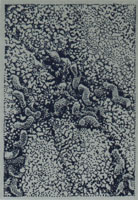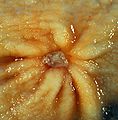Peptic ulcer facts for kids
A peptic ulcer is like a sore or a small hole that forms in the lining of your stomach or the first part of your small intestine, called the duodenum. The duodenum is the tube that food goes through right after it leaves your stomach. The word peptic usually refers to things related to the stomach and digestion.
When these ulcers are in the stomach, they are called gastric ulcers. If they are in the duodenum, they are called duodenal ulcers.
Contents
What Causes Peptic Ulcers?

Most peptic ulcers are caused by a type of infection from tiny germs called bacteria. This specific bacteria is named Helicobacter pylori. It's a very common cause: about 90% of stomach ulcers and 75% of duodenal ulcers happen because of this Helicobacter pylori infection.
Other things can make ulcers worse or increase your risk, but they are usually less important than the Helicobacter pylori bacteria. These other factors include:
- Taking certain medicines called NSAIDs. This is an acronym for Non-Steroidal Anti-Inflammatory Drugs. These are common medicines used to reduce pain and inflammation, like aspirin, ibuprofen, and naproxen.
- Smoking cigarettes.
- Being older.
- Stress from serious diseases or injuries, such as pneumonia or severe burns.
- If other people in your family have had duodenal ulcers.
Signs of Peptic Ulcers
A symptom is a change in your body that can tell you if you have a disease. The main sign of a peptic ulcer is pain in your stomach area. This pain is usually felt in the upper part of your abdomen, just below your ribs. Some people might also feel the pain move up towards their chest.
Other signs of peptic ulcers can be:
- Feeling sick to your stomach and vomiting.
- Blood in your vomit. This can look bright red, or it might look like dark, grainy coffee grounds.
- Having black stools (poop).
How Doctors Find Peptic Ulcers
Diagnosing is how doctors figure out if someone has a disease. They do this by running special tests. Peptic ulcers are usually diagnosed in three main ways:
- Endoscopy: This is when a doctor uses a thin, flexible tube with a tiny camera on the end. This tube goes through your mouth and down into your stomach to look at the lining.
- A breath test: You breathe into a special bag, and the air is tested to see if you have the Helicobacter pylori infection.
- A blood test: A small sample of your blood is taken and checked for signs of the Helicobacter pylori infection.
The best way to find an ulcer is usually with an endoscopy. However, this test can cost more money. An endoscopy is done by a medical specialist called a gastroenterologist. This is a doctor who knows a lot about the digestive system.
A good thing about endoscopy is that it can also help doctors find other diseases if it turns out you don't have a peptic ulcer. Sometimes, the signs of a peptic ulcer can actually be caused by other health problems, and an endoscopy can help diagnose those.
How Peptic Ulcers Are Treated
The most important part of treating a peptic ulcer is to get rid of the Helicobacter pylori infection if it's present. Doctors usually do this with antibiotic medicines. Antibiotics are special medicines that kill germs like bacteria. Often, a combination of different antibiotics is used because the Helicobacter pylori bacteria can be tough to get rid of.
It's also important to reduce the amount of acid in the stomach. Doctors often prescribe two types of medicines to help with this. These are sometimes called antacids or acid-reducing medicines:
- PPIs (proton pump inhibitors)
- H2-Blockers
Both of these medicines work by telling the cells in your stomach to make less acid. While stomach acid is important for digesting food, sometimes there's too much, which can make an ulcer worse. These medicines help control the acid levels so the ulcer can heal. Some people also find that drinking water and avoiding certain foods can help manage acid levels.
To treat peptic ulcers effectively, doctors usually combine antibiotics (to kill the bacteria) with acid-reducing medicines. The goal is to get rid of the Helicobacter pylori and control the acid so the open sores in the stomach lining can heal faster.
Once the Helicobacter pylori infection is gone, the ulcer should heal. However, it can come back if a person gets reinfected with Helicobacter pylori again.
Images for kids
See also
 In Spanish: Úlcera péptica para niños
In Spanish: Úlcera péptica para niños



